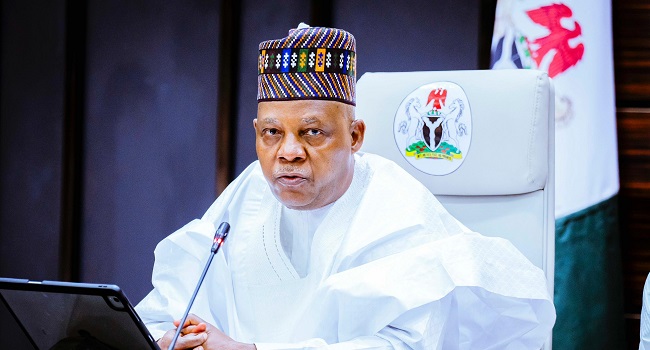The Federal Government of Nigeria has joined forces with the United Nations Children’s Fund (UNICEF) to equip 20 million young Nigerians with essential digital skills by the year 2030.
This announcement was made by Vice-President Kashim Shettima during a meeting with Mohammed Fall, the UN’s resident and humanitarian coordinator in Nigeria, held in Abuja on Tuesday. The discussion also included UNICEF’s Deputy Representative, Rownak Khan, and Celine Lafoucriere, Chief of the UNICEF Lagos Field Office.
Mr Shettima highlighted that Nigeria’s rapidly expanding population, now exceeding 230 million with an average age of 17, presents both challenges and opportunities. He has accepted the role of chair for Generation Unlimited Nigeria (GenU 9JA), a collaborative initiative designed to assist young Nigerians aged 10 to 24 in transitioning from education to employment through enhanced digital connectivity.
“It is a privilege to lead Generation Unlimited, GenU 9JA,” stated Mr Shettima. “This platform opens a multitude of opportunities for our youth. To survive and prosper, we must empower them through digital means.”
He further indicated that the GenU 9JA initiative aligns with the Federal Government’s Renewed Hope Agenda, which focuses on inclusive development, digital innovation, and youth empowerment.
Mr Shettima stressed that Nigeria seeks sustainable and equitable partnerships rather than mere charity. “We are not after handouts; we desire a relationship founded on mutual respect and shared goals. This is why I am deeply invested in this digital initiative. To thrive in this region, we must engage and empower our youth.”
He described the initiative as a transformative programme that allows Nigerian youths to market their skills globally. “The digital landscape provides an effortless entry point for youth engagement. Many young Nigerians are successfully working for international companies from the comfort of their homes,” he remarked.
Earlier, Mr Fall emphasised that GenU 9JA plays a pivotal role in tackling youth unemployment, educational disparities, and digital exclusion. “Under the Renewed Hope Agenda, initiatives focused on youth—skills development, digital access, and employment—are vital. GenU is at the forefront of these priorities,” he noted.
Additionally, Ms Khan affirmed that GenU 9JA stands as one of UNICEF’s most impactful global youth empowerment initiatives, with Nigeria serving as a leading example. “Nigeria has achieved remarkable outcomes; few countries have reached the level of youth impact that GenU 9JA has demonstrated,” she stated.
She explained that the programme is structured around three key pillars: digital connectivity, pathways from learning to earning, and youth engagement and empowerment, all aimed at readying Nigerian youths for the contemporary job market.
Ms Lafoucriere added that since its inception in 2022, GenU 9JA has positively affected over 10 million young individuals, securing 1,500 job linkages thus far. “To achieve our goal of reaching 20 million youths by 2030, we must enhance collaboration among partners and align more closely with national policies,” she concluded.











